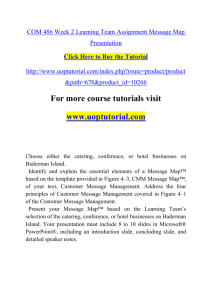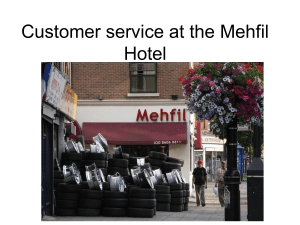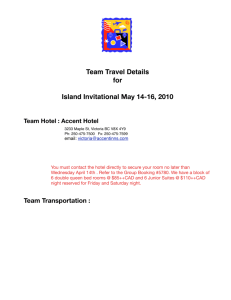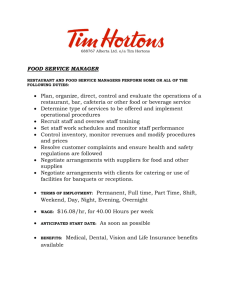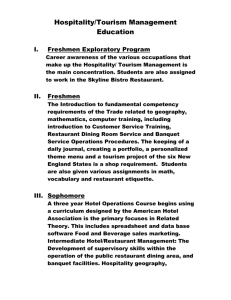Presentation Module 2
advertisement
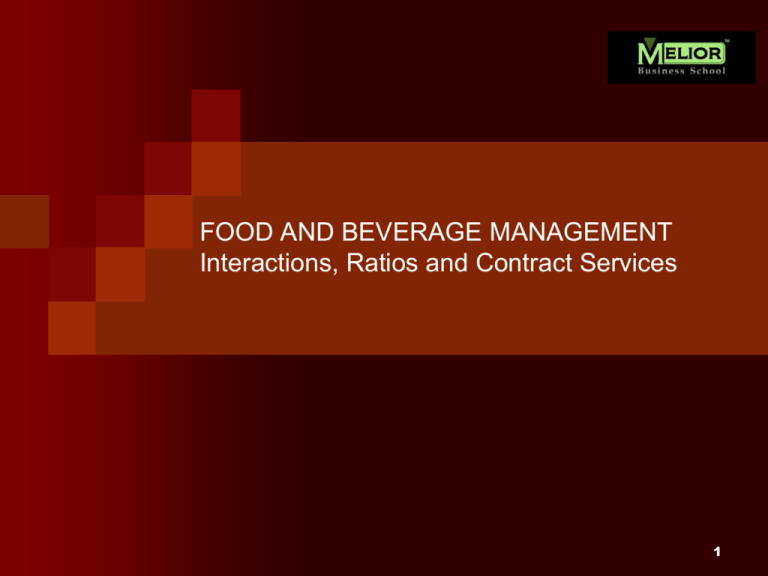
FOOD AND BEVERAGE MANAGEMENT Interactions, Ratios and Contract Services 1 Operational Interactions F & B division and other units are mutually dependent. There should be direct interaction between: Front desk and F & B - specific guest requests Sales department and banquet unit – banquet and conventions bookings F & B and Front Office – announce new menu or special activity Guest relations unit and F & B – feedback on utilization rate of F & B outlets Operational Interactions F & B manager must know who the customers are, what they like and how many customers to expect with the input from other departments and units. Every hotel employee should be trained to refer / recommend F & B services to guests. Operating Ratios - important Food and Beverage Sales per Available Room total food and beverage sales = $? per room no. of rooms available Food and Beverage Occupancy number of covers = ? turns number of seats Sales per Available Seat total food and beverage sales = $ per seat no. of seats available Average Check total food and beverage sales = $AC no. of covers Ratio of Beverage Sales to Food Sales Beverage sales x 100% = ? % Food Sales Food Cost Percentage Cost of food x 100% = ? % Food sales Labor Cost Percentage F&B Labor Cost x 100% = ? % F&B sales Director of Food and Beverage Objectives: Meet and exceed guests’ needs and expectations by ensuring proper service standards, providing quality food and beverages, managing all aspects of operations. Provide all guests with the highest quality F&B experience by working as a team with all F&B outlets, ensuring prompt, polite and professional services, resulting in increasing employee morale, decreasing turnover rates and lowering service times. Director of Food and Beverage Objectives: Seek profitability in the F&B department by decreasing all costs, maximizing sales in all outlets, achieving budget and profit guidelines, meeting and / or exceeding long / short range goals. Director of Food and Beverage Specific Operations Functions: Provide the highest quality in food, beverage and service in all outlets. At least one daily walk through of all F&B areas Maintain existing programs and develop new programs Daily talks with all staffs and managers Maintain high quality image through effective housekeeping and sanitation Maintain physical security for all outlets and inventories Know local competition and industry trends Change menus based on seasonality and product availability Director of Food and Beverage Specific Management Functions: Directs and coordinates all activities of personnel and departmental responsibilities Daily contacts with staff and performance reviews Marketing of each F&B outlet Achieve budgeted sales and maximum profitability Maintain fair wage and salary administration Strategic Alliance between Hotels and Restaurants Four key questions What are the hotel customers’ F&B needs and expectations? Which F&B concept best aligns with the positioning of the hotel? Would converting the restaurant to a brand name restaurant improve the hotel’s bottom line? Would turning to a brand name F&B operation give the hotel a competitive advantage? Strategic Alliance between Hotels and Restaurants Reasons for alliance between brand name hotel and restaurants: Create financial benefits Provide guests with greater value Improve the hotel’s overall image Strengthen the hotel’s competitive advantage Create operational advantage Strategic Alliance between Hotels and Restaurants Types of restaurants: Quick Service ◦ Yeebo ◦ Au Lac Do Brazil ◦ Li Bai @ Sheraton KFC Lotteria Pho 24 Casual Al / Family Fresco Pizza Hut Ngon Upscale Theme ◦ Hard Rock Café Restaurant Franchise Advantages Helps to reposition hotel May increase revenues, occupancy, profits Franchiser is continually assessing and improving menu Franchiser is knowledgeable about restaurant business Disadvantages Franchise fee High initial investment Requires a certain volume to warrant using a franchise brand Restaurant Franchise Factors to consider 1. Desired hotel position and customer perception you want to create for your hotel. 2. Assess the revenue and costs, profitability of having a franchised brand restaurant 3. Select a restaurant company that has the same corporate culture and shares the same operational goals 4. Consider the menu offered, restaurant décor, training support and management support from franchiser, and ability to handle room service Contract Relationships 4 types of relationships between hotel and F&B outlets Internally developed restaurant brand Franchised restaurant brand Straight lease Management contract Contract Relationships Internally developed restaurant brand Hotel develops own restaurant with little outside help. The restaurant is a unit belonging to the hotel controlled by F&B director. Advantages: Hotel has total control over all the operations. No need to pay any fees to outside parties, hotel keeps all profits Contract Relationships Disadvantages: Hotel may not have the expertise to successfully run a restaurant business Developing the restaurant into a famous brand takes a longer process Contract Relationships Franchised restaurant brand Hotel buys a franchise from a famous restaurant franchisor. Franchisee (hotel) operates the restaurant according to the guidelines laid down by franchisor including: Menu Décor Food preparation Service processes Contract Relationships Advantages: Franchisor has the expertise and know-how Franchisor can provide training to the personnel in the restaurant The franchisor’s brand is already a recognized brand with a ready customer base. Disadvantages: High franchise fees Hotel has less control in the operations Contract Relationships Straight lease Hotel rents out the space inside the hotel to an outside restaurant company. Hotel only collects rent; it has no say in the operations of the restaurant Advantages: Guaranteed revenue from rental Disadvantages: Little control over the operations Restaurant may be a mismatch with the hotel’s positioning Contract Relationships Management Contract Hotel lets an outside company manage its restaurant. Hotel pays the company a management fee Management company is responsible for recruitment, selection and training, as well as all day-to-day operations Personnel may or may not be under the payroll of hotel. Contract Relationships Advantages: Management company has the expertise and know-how Disadvantages: Management fees and possibly profit sharing Hotel has little control in the operations Hotel Catering Refers to providing food and beverage service outside of a restaurant / bar / café setting. May be done in a meeting room / ballroom / courtyard / garden or other locations. The F&B division is in charge of not only food preparation but also decorations, such as table settings and lighting. A huge revenue generator for the hotel High visibility and can create an image for the hotel Hotel Catering - Personnel Director of catering (reports to director of F&B) Oversees all catering functions Works closely with Director of Sales and Marketing Catering managers (reports to director of catering) Maintain client contacts, plan menus, themes, room set up, décor, negotiate with clients Hotel Catering - Personnel Banquet Manager (reports to director of catering) Supervises maitre d’, room captains, servers, bartenders. Acts on director of catering’s requests Supervises table settings and décor Scheduler Plans (in a big catering operation) the rooms, reception area and time schedule Keeps records to avoid overbooking or double booking Hotel Catering - Personnel Maitre d’ Supervises all service personnel including captains, servers & all aspects of guest service Captain Manages a section or a specific room Supervises the servers in the section or room Server Serves either food or beverage Bartender Serves alcoholic drinks Hotel Catering - Personnel Steward / Housemen Set up the equipment, tables , chairs, glassware, crockery and cutlery Engineering Provides department personnel necessary utilities such as airconditioning, electrical wiring, audio visual equipment, banners
